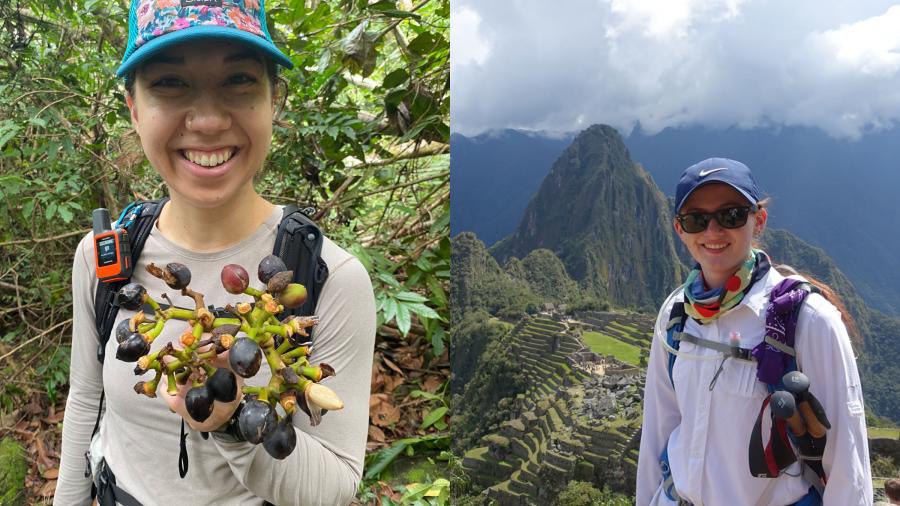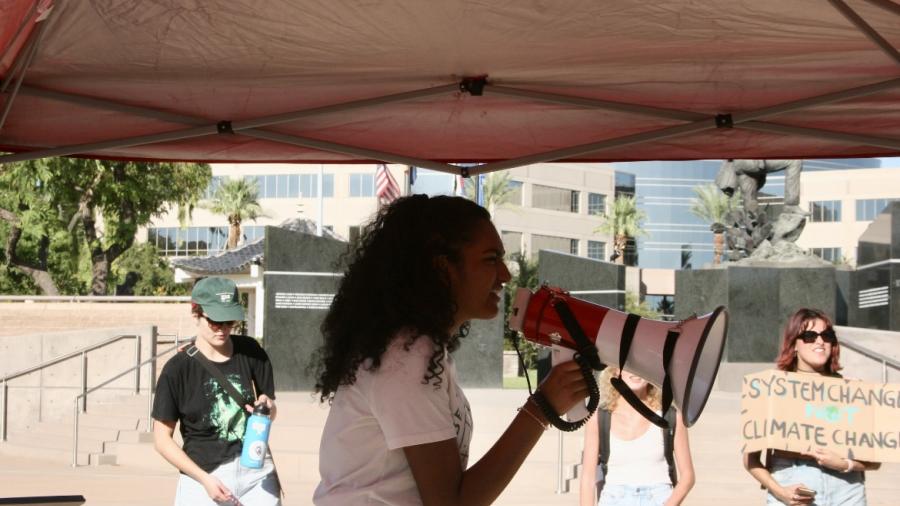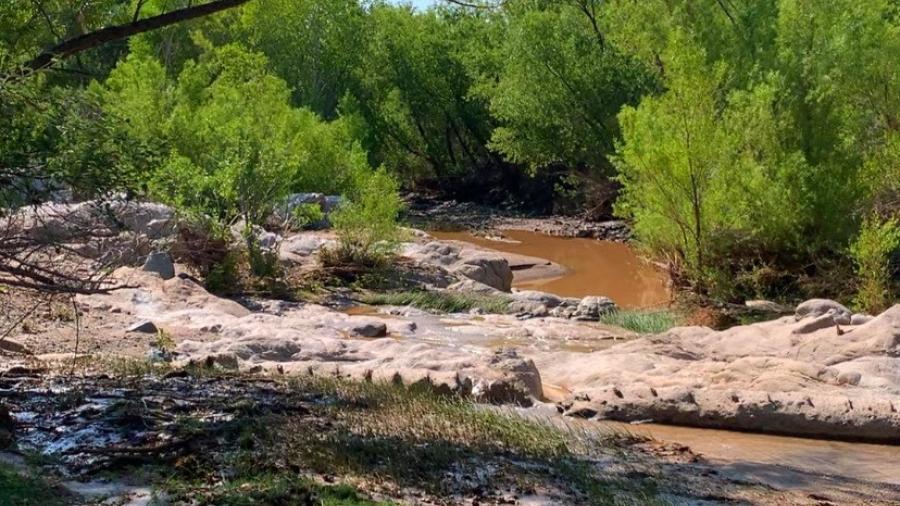Souls of SOLS, February 2025: Highlighting graduate student stories

Note: This story is part of an ongoing series profiling graduate students in the School of Life Sciences. See January's featured students here.
Carmen Webster – Evolutionary Biology PhD
The region of Amazonia in southern Colombia is lush, green, and riddled with palm trees. But not all the palm trees are equal: people in the region have been cultivating one species in particular, Astrocaryum chambira, colloquially called chambira, for thousands of years, using its leaves to make everything from roofs and textiles to ornaments and handbags.
The chambira’s leaves are stronger and tougher than those of its most closely related species. Carmen Webster, a PhD student in the Sanín lab, suspects the difference in the two species’ leaves is a result of the chambira's history of cultivation. But to prove her theory, she’s comparing the two palms’ DNA using samples she’s collected in the field over the last two years.
"Chambiras are planted or grown in chagras, which are like personal gardens in rural communities, but that are embedded in the forest. It’s a kind of agroforestry, which is less invasive than traditional agriculture, and encourages the native biodiversity of the area,” Webster explains.
“[My team] basically goes into the field and communicates with rural communities to ask them about which plants they use. Then if the species is one of the plants I’m studying, we ask permission to collect, then bring the leaf tissue sample home to sequence as much as we can of the whole genome... [The chambira’s] sister taxon doesn't have strong, fibrous leaves, and they're super short, and they break easily. So specifically, some of the things I'm looking for are selection or variation occurring within genes that play a role in leaf structure.”
Webster is also interested in looking at how the palms evolved and when they became different species, as well as what’s driving some of the palms towards extinction, a line of research that she hopes will help inform real conservation decisions.
Webster has always been interested in genetics and evolution. As an undergraduate at the University of Texas, El Paso, she did research on genes associated with learning and memory in Drosophila.
“It was super interesting, but then I took a botany class during my last year of undergrad, and I was like ‘plants are where it’s at,’” she laughs.
So, she pursued a master’s studying population divergence of Arctic plants, then took a job as a lab technician at ASU’s West campus, where she met her current mentor, María José Sanín.
“It wasn't until I met María that I felt comfortable and confident enough to be able to pursue a PhD. And changing from Arctic plants to Tropical plants was also one of the coolest things I've ever done, too... the biodiversity in the Amazon is just absolutely bustling. And it’s been a super cool experience to learn how local and Indigenous people can and still use the forest today, how they coexist with it so well because they’ve been doing it for 1000s of years. That’s been a really rewarding part of my research.”
Maxine McCarty – Evolutionary Biology PhD
At twenty-one years old, Maxine McCarty spent many of her days radiocarbon dating shards of bone that had been dug up from a Paleolithic cave in southern Italy. As a master’s student at the University of Oxford, she was part of a research team that investigated the chronology of one of the oldest anatomically human material cultures in Europe – a pursuit that could help answer questions about the migration and distribution of hominid species.

McCarty had grown up in Piedmont, California, and moved to the UK to do her bachelor’s of science in archaeology at the University of Durham.
“Ever since I was a kid, I wanted to be an archaeologist,” McCarty smiles, “For as long as I can remember, that’s always been my goal – I even wrote that it was my dream job in my first-grade yearbook.”
While at Oxford, though, McCarty moved away from more traditional archaeological methods, which often involve analyzing and categorizing artifacts at a surface level, and dove into the molecular level. Now, as a PhD student in the Stone lab, McCarty is still working with artifacts and studying ancient humans – just like she dreamed of doing as a kid – but now, she’s doing it by reading sequences of ancient DNA.
“I love archaeology, but it’s super subjective. It’s cool to have a tool [like ancient DNA] that’s more definitive. We can make better conclusions with it.”
Scientists only started working with ancient DNA – or DNA that can be up to tens of thousands of years old -- in earnest in the 1990s, a little after the technology to sequence DNA in general was developed. Now, the young field of ancient DNA research is growing, and being used to answer questions about human anthropology, genomics, and evolution; in 2022, the Nobel Prize in Physiology or Medicine went to a Swedish ancient DNA researcher for his work sequencing neanderthal genomes and studying human evolution. McCarty was brought to the growing field with the aim to look into similar subjects.
“I’m hoping my current research will allow me to delve deeper into human evolution -- looking more at how we came to be, and what adaptations we’ve accrued over time.”
McCarty aims to use ancient DNA to answer questions about the people who lived in southern Peru before European contact, filling in gaps in the archaeological record about those populations’ demography and ancestry. That work will help other researchers put together the pieces of the story of human evolution in the Americas.
Additionally, McCarty also plans to study those populations’ interaction with tuberculosis, an infectious lung disease. For many years, scientists thought tuberculosis was a disease that Europeans brought to the Americas. But Anne Stone – McCarty’s advisor – helped provide evidence that tuberculosis existed in the America’s long before European colonization. McCarty plans to sequence the bacterial DNA of tuberculosis samples as old as 2000 years to try and find out what strains of tuberculosis existed in southern Peru back then, and how the disease spread.
Ancient DNA research can be difficult, though, because DNA samples that old are often too degraded to sequence. McCarty will be traveling to Peru this summer in hopes of finding bone samples that are good enough quality for her to use in her research.
“I’ve got to practice my Spanish,” McCarty laughs, “but I’m excited that I’ll get to go see where these samples I work with are from.”


